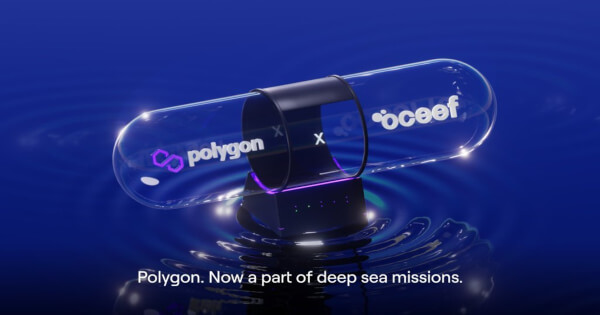Polygon Partners with NGO OCEEF for Ocean Conservation Initiatives
Samuel Edyme Oct 07, 2022 07:55
This collaboration between Polygon and OCEEF aims to offer interactive experiences to facilitate ocean conservation actions.

On Thursday, decentralized Ethereum scaling platform, Polygon announced it would join forces with the Ocean Conservation Exploration and Education Foundation (OCEEF) to advance ocean literacy by finding new ways to give people exposure to deep-sea missions.

According to Polygon, this partnership aims to offer interactive experiences through a governance platform where participants can help make key decisions surrounding the RV Odyssey, one of the most advanced ocean research vessels around the globe.
Polygon tweeted:
"A new wave in ocean conservation @oceef_, a world-class ocean conservation NGO, is working with #Polygon towards a next-gen ocean conservation initiative...Participants will be able to explore all of the ship's facilities and real-time data via immersive, interactive experiences in the Metaverse."
In addition, Polygon further stated this product would be supported by purchasing NFTs, and Polygon's distributed governance platform will help OCEEF increase engagement.
Using Metaverse and other Web3 tools, Polygon is said to help democratize access to RV Odyssey. With this, participants can decide the vessel's future itinerary, research, and even engage in the missions on board.
"Using our Polygon partnership and its carbon-neutral tech as a launchpad, we will be using technology to democratize access to the vessel through multiple Web3 platforms as well as provide participants with the ability to help decide the vessel's future itinerary and research," said OCEEF Founder Alex Moukas at the Green Blockchain Summit 2.0 hosted by Polygon.
Furthermore, OCEEF will allow participants to assist in decisions, including missions, participation, and locations. Co-founder of Polygon, Sandeep Nailwal, spoke concerning this topic, saying:
"Being able to facilitate a global endeavour such as the one that OCEEF is undertaking is very humbling. I know that our technology is up to the task of bringing these types of immersive, educational, and change-making experiences to people all over the globe."
In April, Polygon's core team announced its commitment to transforming into carbon-negative by the end of the year and pledging $20 million to climate-related projects. Since then, Polygon has achieved carbon-neutral status, eliminating 104,794 tonnes of greenhouse gasses, more than the entirety of the network's CO2 debt since inception.
Image source: Polygon.jpg)